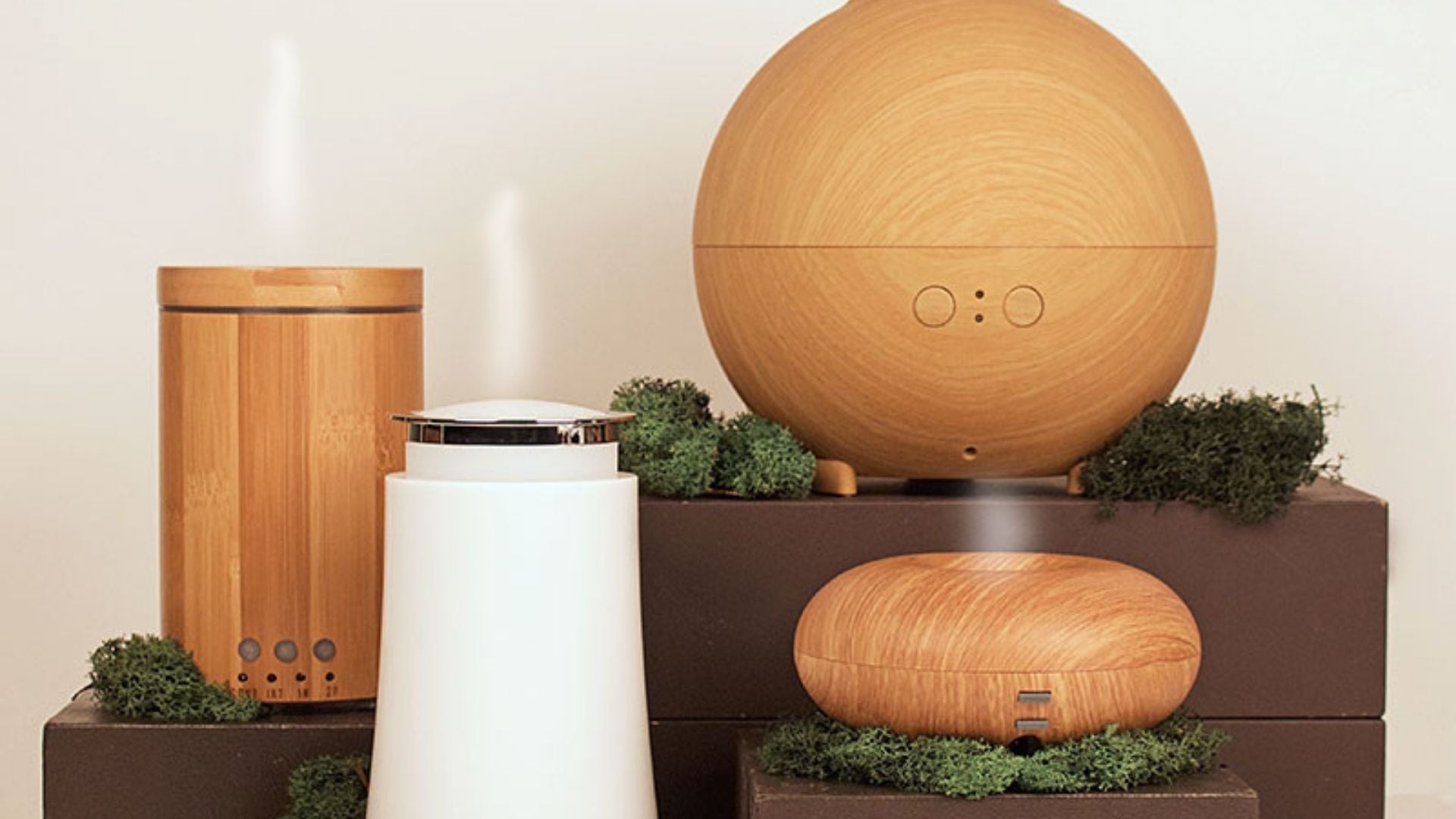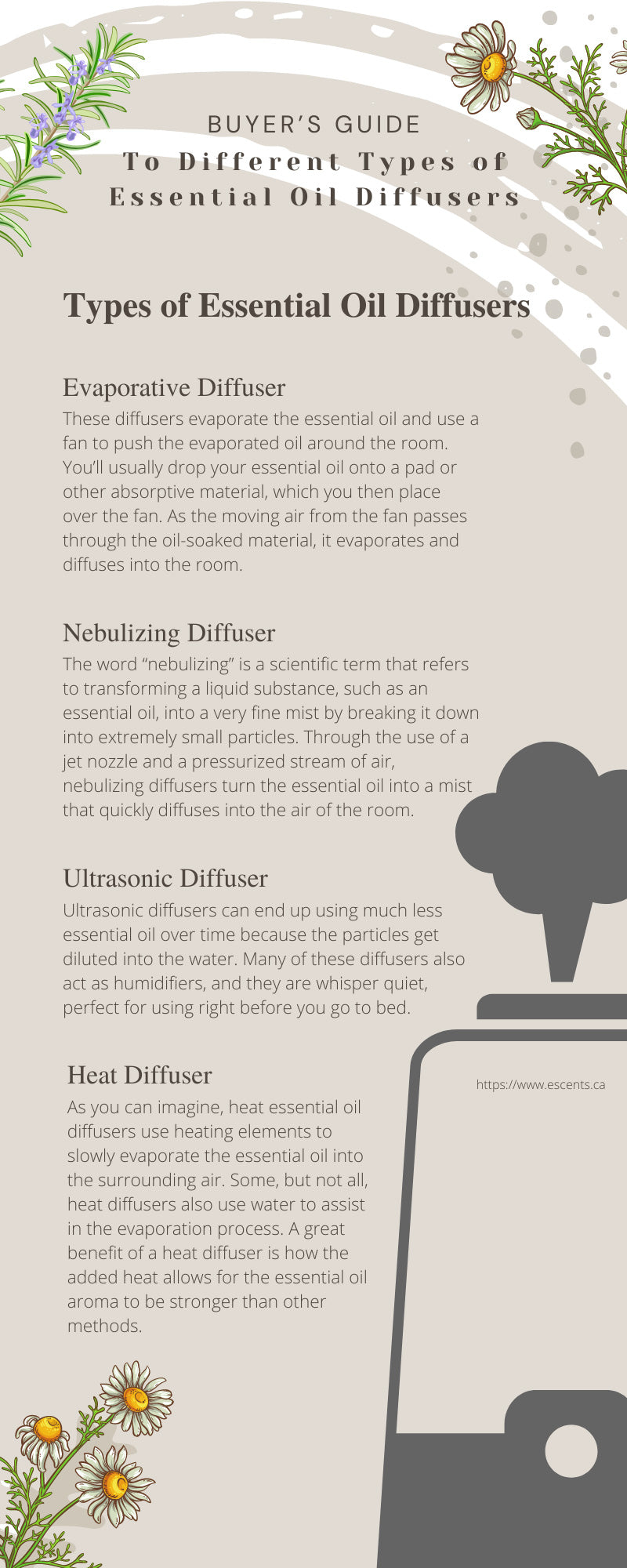
Whether you are brand new to using essential oils or you already use them all the time, you probably want to know how you can get the most out of them. When it comes to essential oils, a little bit can go a long way. There are many different ways to use essential oils on yourself through topical application, inhalation, or even ingesting certain oils. But how can you get the benefits of your favorite essential oil around the clock? Your answer is by using an essential oil diffuser to spread the oils into the air and around your home.
If you try to find an essential oil diffuser online, you might get overwhelmed at how many different types there are and what might make one better than another. We want you to feel confident in your decision when you buy a diffuser because we know how beneficial they can be. That’s why we here at Escents Aromatherapy created this buyer’s guide to different types of essential oil diffusers to help walk you through the diffusers you’ll see the most and how they differ from one another. By the end, you should have a better idea of which diffuser will suit your needs the best.
Why Are There Different Types of Diffusers?
If a diffuser is just a device that spreads essential oil into the air, why are there so many different methods of doing that? To understand this, we need to implicitly understand that everyone has a different goal for their diffuser. Some people choose to see their diffuser as a simple air freshener, while others use their diffuser as an aromatherapy tool in their homes. As we go through the different types of essential oil diffusers, you’ll start to see how and why they differ to deliver unique experiences based on the user’s desired goal.
Types of Essential Oil Diffusers
Essential oil diffusers are usually one of four types: evaporative, nebulizing, ultrasonic, and heat. Despite their different methods of delivering essential oils into the air, all these diffusers share the same purpose of creating a unique atmosphere that you choose based on the essential oils you want to use. No matter what type you pick, a diffuser will help you improve your home’s air quality, while also delivering the specific benefits of the essential oils you choose to place inside of them.
Evaporative Diffuser
An evaporative diffuser tells you what it does right in the name. These diffusers evaporate the essential oil and use a fan to push the evaporated oil around the room. You’ll usually drop your essential oil onto a pad or other absorptive material, which you then place over the fan. As the moving air from the fan passes through the oil-soaked material, it evaporates and diffuses into the room. One thing to know about these diffusers is that they can evaporate certain essential oils in different stages. The lighter components of the oil will evaporate first, and the heavier components will follow later. While evaporative diffusers are quite silent and spread scents quickly, you may not get the full effect of the oil right away because of the different evaporation stages.
Nebulizing Diffuser
Nebulizing diffusers are a bit more complicated than simply using a fan. The word “nebulizing” is a scientific term that refers to transforming a liquid substance, such as an essential oil, into a very fine mist by breaking it down into extremely small particles. Through the use of a jet nozzle and a pressurized stream of air, nebulizing diffusers turn the essential oil into a mist that quickly diffuses into the air of the room. Nebulizing diffusers are great for aromatherapy because you can easily inhale and absorb the extremely tiny particles of oil. They release all the oil at once, unlike in stages like in an evaporative diffuser, and they don’t use any heating element or water. However, nebulizing diffusers are more advanced in terms of technology, which makes them slightly more expensive than other diffusers. Also, some nebulizing diffusers tend to use up essential oils too quickly because of the efficient diffusion method.
Ultrasonic Diffuser
Like a nebulizing diffuser, ultrasonic diffusers also turn essential oils into a fine mist that you can easily inhale. Unlike nebulizers, they do this using water and a small disk that creates ultrasonic vibrations. These vibrations break up the essential oil into microscopic particles, which then mix with the water and spread into the air. Ultrasonic diffusers can end up using much less essential oil over time because the particles get diluted into the water. Many of these diffusers also act as humidifiers, and they are whisper quiet, perfect for using right before you go to bed. You should make note of the fact that ultrasonic diffusers create a mist that isn’t completely essential oil, as it also uses a good amount of water. If you live in a humid area, this diffuser may not be the best option for you since it adds additional moisture into the air.
Heat Diffuser
As you can imagine, heat essential oil diffusers use heating elements to slowly evaporate the essential oil into the surrounding air. Some, but not all, heat diffusers also use water to assist in the evaporation process. A great benefit of a heat diffuser is how the added heat allows for the essential oil aroma to be stronger than other methods. Heat diffusers are also usually very quiet, and they don’t use up the oils you put into them very quickly. However, you need to be careful with heat diffusers because some low-quality models will use too much heat and alter the chemical components of the oil. If you want to use a heat diffuser, it’s a good idea to find a high-quality one that doesn’t overheat the oil and ruin its chemical benefits.
Now that you have a better idea of the options you have, you can buy an essential oil diffuser with a little more confidence since you know what you’ll get and what you can expect. Escents Aromatherapy offers a wide range of diffusers for you to use wherever you need them most. If you still aren’t sure which one is right for you, don’t be afraid to reach out to us and ask for assistance. We’ll be glad to help you out!
